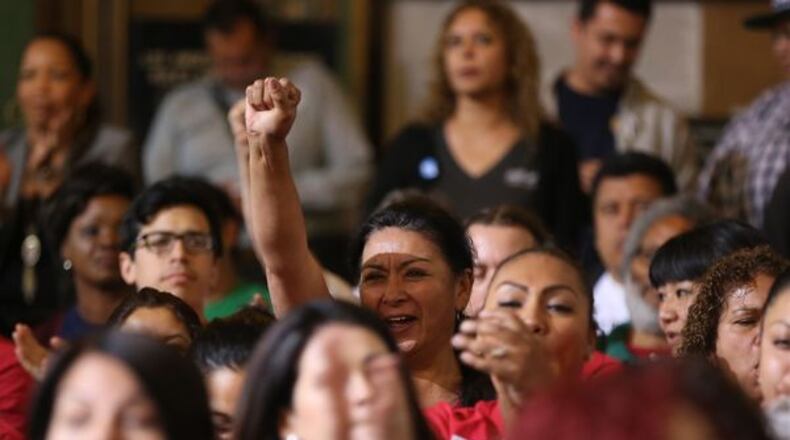You can say a lot of things about labor unions, but you can't say they don't understand economics -- at least, when it's convenient for them to do so.
Earlier this month, Los Angeles became the latest city to set its minimum wage on a course to rise to $15 an hour by 2020. Within this piece by the Los Angeles Times about the city council's vote is a sentence that probably seemed obvious to the point of superfluousness at the time:
"During nearly a year of often emotional debate, labor leaders never gave ground on their central demand that the minimum wage rise to at least $15."
The unions fought for that demand over an alternative proposal by Mayor Eric Garcetti for a target of only $13.25 by 2017. A former head of the Los Angeles County Federation of Labor -- keep that organization's name in your head -- called the measure a matter of alleviating poverty.
Fast-forward eight days, and suddenly the unions were singing a different tune (again via the Los Angeles Times):
"For much of the past eight months, labor activists have argued against special considerations for business owners, such as restaurateurs, who said they would have trouble complying with the mandated pay increase.
"But Rusty Hicks, who heads the county Federation of Labor and helps lead the Raise the Wage coalition, said Tuesday night that companies with workers represented by unions should have leeway to negotiate a wage below that mandated by the law.
"'With a collective bargaining agreement, a business owner and the employees negotiate an agreement that works for them both. The agreement allows each party to prioritize what is important to them,' Hicks said in a statement. 'This provision gives the parties the option, the freedom, to negotiate that agreement. And that is a good thing.'"
Let's pause for just a moment to admire the sheer and unconstrained chutzpah of a union leader arguing for workers to have "freedom" to negotiate the terms of their employment -- which is exactly what a labor union seeks to deny workers on an individual basis by imposing the terms of employment on all workers through collective bargaining. Note, too, the complete, brazen hypocrisy of Hicks' arguing for a union exception after leading the coalition that had just sought the wage increase on a no-exceptions basis.
At Forbes, UGA economics professor Jeffrey Dorfman explains why the unions had such a quick change of heart (at least, in public; this second step of their campaign was no doubt planned long in advance). Noting a study last year by the nonpartisan Congressional Budget Office that found an increase in the national minimum wage to just $10 an hour would be likely to kill 500,000 American jobs, Dorfman writes :
"However, unions asking for an exemption from Los Angeles' higher minimum wage is a clear admission by the unions that they understand the basic principles of economics. They know such an absurdly elevated minimum wage would cause many workers to lose their jobs as employers cannot afford to keep workers who simply are not worth that much.
"To put $15 per hour into perspective, according to the National Center for Education Statistics, that is the median earnings for somebody with a high school degree but no college. That means half of high school graduates earn less than what Los Angeles is proposing for a minimum wage. How could such a wage floor not cost jobs?
"Actually, there is one way to avoid the large scale job losses sure to result from such a minimum wage increase and the unions have the answer. Because union workers could be paid a sub-minimum wage, employers who wish to avoid the $15 per hour minimum wage can encourage their workers to unionize. Then they can pay a lower wage (assumedly something higher than what the employer was paying, but lower than the non-union minimum wage). Workers get a smaller raise, but still a raise, and they get to keep their jobs (or at least most of them do; since wages are still likely to rise somewhat, employment will still drop by a smaller amount)."
In the end, the entire push by unions for a minimum-wage hike appears to be a ploy to add to their own numbers. Which, of course, means collecting dues from those new members to spend on union-boss salaries and political donations to Democratic politicians, who are only too happy to go along with farces such as the one that played out in Los Angeles.
It is a testament to the lack of appeal and usefulness of today's labor unions that they cannot persuade workers to join them so they can bargain for higher wages and other benefits. Thus, unions resort to asking the government to mandate higher wages -- and then relying on business owners to encourage their workers to unionize so the union can renegotiate the workers' wages back downward. Instead, employers may be more likely to seek ways to automate some of the jobs from which workers will be priced out, cementing the job-killing effects of such a steep wage hike, of which the unions apparently knew all along.
The entire episode may set a new record, even among unions, for chutzpah and hypocrisy.
About the Author
Keep Reading
The Latest
Featured



